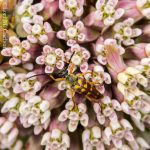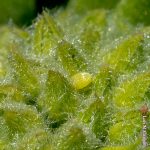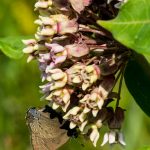Milkweed Mondays are a special series of blog posts that highlight the species of Asclepias we will be offering this year for purchase at plant sales, community outreach events, and our annual Open House.
Common Name: Common Milkweed
Latin Name: Asclepias syriaca
Bloom time: June hrough August (this can vary depending upon where you call home and due to climate change)
Sun: Full sun
Water: Dry to medium
Height: 2 to 4 ft
Spread: 1 to 3 ft, slow spreader
Native: Yes
Host Plant: Monarch
Nectar Plant: Monarchs, Fritillaries, Swallowtails, American and Painted Ladies, Hairstreaks, and more
Colors & Cultivars: Pink, mauve, and white
Our Experience: We find that when the drought period of summer arrives that we need to regularly water in order to keep the plant from withering and prematurely dying back. Monarchs tend to favor using this as a host plant early in the season. Eggs can be found on flower heads and the tiniest of new leaves at the top. Eggs are also laid on the undersides of mature leaves. It takes a couple of seasons for a colony of plants to establish. The flowers are wonderfully fragrant.
Pros: Huge leaves are what get us through the multiple brood cycles of voraciously hungry caterpillars during the hottest parts of summer when caterpillars rapidly grow. Leaves can be cut and stored wrapped in wet paper towels in an air-tight container stored in the fridge. Plants can tolerate loss of leaves and will quickly regrow.
Cons: Though it can tolerate drought conditions and doesn’t require a lot of water, in order to keep leaves green and suitable for feeding caterpillars we recommend supplemental watering during the drier periods of summer.
Rating: 4.5 out of 5
About the photos on this page
Featured: Common milkweed in our habitat
Bottom, left to right: Banded longhorn beetle on common milkweed in our habitat; Monarch egg on developing flowerhead; Banded Hairstreak on wild growing common milkweed in Brodheadsville, PA



